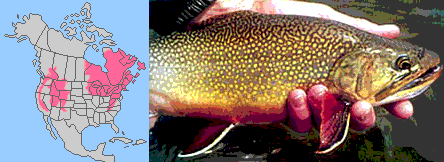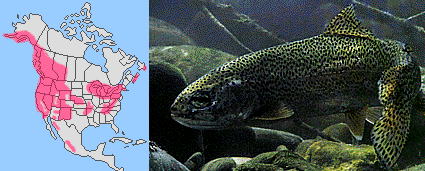 Brook Trout
Brook Trout
|
Brook trout are also commonly called Eastern brook trout, brookies, speckled trout, native trout, and squaretails. A brook trout in the Great Lakes that migrates up tributaries to spawn is known as a coaster.
Brook trout are not spectacular leapers, but are powerful fighters for their size. They will take a dry fly, but subsurface flies generally work better. Many are caught on small spoons and spinners, and on worms, leeches, minnow, and a variety of other live baits. Brookies are the least wary and easiest to catch of the salmonids.
Brook trout thrive in streams, lakes, and ponds that are not too cold and clear. They prefer water of 50° to 56° F. Because of their coldwater habits, brook trout often are confined to the headwaters of spring-fed streams. Although there is still plenty of good brook trout water in the United States, a great deal of prime habitat has been lost to stream channelization, dam building, pollution, and streambank erosion caused by deforestation and overgrazing. Today, the best brook trout waters are in sparsely populated regions of Labrador, Quebec, and Manitoba.
Eating Habits
The brook trout's diet is extremely varied, depending on what is available. Some of the food items found in brook trout stomachs include tiny larval insects, small fish, field mice and even snakes.
World Record
14 pounds, 8 ounces, caught in the Nipigon River, Ontario, in 1916.
|
 Rainbow Trout
Rainbow Trout
|
The leaping ability of the rainbow is legendary. A hooked rainbow almost always skyrockets from the water, often a half-dozen times, before coming to the net. Rainbows are less wary than brown trout and more willing to bite. They are a favorite of fly fishermen, but can also be caught on spinners, spoons, plugs, and a wide variety of baits ranging from worms to small marshmallows.
Eating Habits
The diet consists mainly of immature and adult insects, plankton, crustaceans, fish eggs, and small fish. But rainbows consume far fewer fish than brown trout. Their habit of taking adult insects on the surface makes dry-fly fishing particularly effective.
World Record
1993 - 31 pounds, 6 ounces, a landlocked rainbow caught in Lake Michigan.
|
|
|
|
|
|
|
|
|
|
|
|
|
|
|
|
|
|
|
|
|
|
|
|